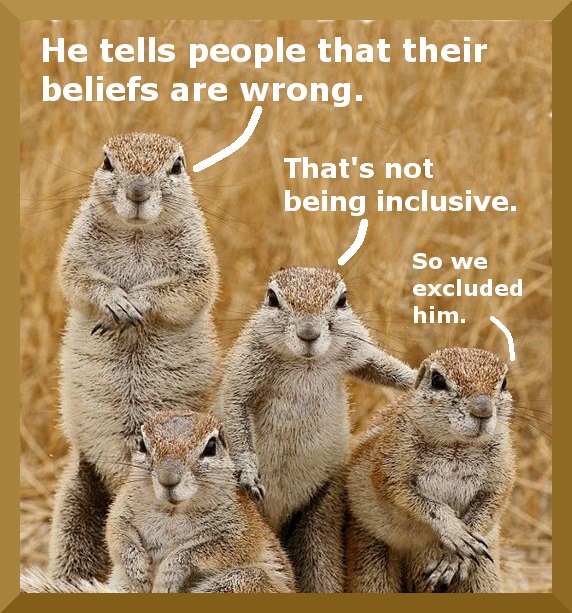
Earlier this year I was invited to speak to an ecumenical religious group about my book, Religion Refuted. The organizers promptly disinvited me on the basis that I might tell someone that their beliefs are wrong, which is apparently not an act of inclusivity. The message was clear: One mustn’t hurt anyone’s feelings by questioning their beliefs.
This group’s response to my alleged lack of inclusivity was to exclude me. The irony was lost on them.
Okay. It’s their group. And it’s their call. And their loss.
And yes, I do consider it a loss any time a group closes their ears to contrary opinions. Ideas should never be squelched because they are deemed too dangerous or offensive.
Please go read John Stuart Mill’s essay On Liberty. It’s a short essay. You don’t even have to read the whole essay. If you’re busy, just read the first half. Mill’s defense of maintaining a free marketplace of ideas is the most important piece of literature ever written.
This morning I got my ideas rejected again. A conservative preacher shared on Facebook an article in support of North Carolina’s law that prohibits transgender people from using the bathroom of their choice. The author of the article complained, “If one’s sex is a choice, why not one’s age? …If I believe I am 65, what basis do you have for disagreeing with me?”
This is the notorious slippery slope argument. I posted a comment in response, pointing out a fundamental misconception underlying the author’s questions.
One’s sex is not a choice, I explained. Those who feel trapped in a body of the wrong sex are not choosing their sex. They are choosing neither their sexual anatomy nor their psychological state. These are people whose brains (and therefore mental states) are structured in a way that is incongruent with their genitalia. In other words, their physical organs (brain and sex organs) are not synchronized. This is not something they voluntarily choose.
My comment was promptly deleted. The preacher did not welcome my opinion. Like the ecumenical religious group that had disinvited me, the preacher was letting me know that questioning beliefs is unacceptable.
If you’re religiously or politically outside the mainstream, then you know what it is like to have your ideas shunned. People hate to be questioned.
A few days ago I came across a meme that read: “Jim is an atheist. When his religious friends post religious comments online, Jim doesn’t reply arrogantly and condescendingly. He just ignores it and lets them believe what they want.”
I felt compelled to post a reply. I observed that this meme offered the atheist only two options: (1) ignore the religious posts and let the believers continue holding their beliefs unchallenged or (2) reply arrogantly and condescendingly. Anyone acquainted with propositional logic will recognize this as a false dichotomy. The author of the meme failed to mention the third option, which is for the atheist to voice his or her dissent in a civil manner. The author of the meme likely omitted this option because he deems it rude to question people’s religious beliefs.
There is something seriously wrong with a society that has huge swaths of its population who are so fragile that they cannot be exposed to contrary perspectives without it causing them severe psychological trauma. We live in a nation of pussies.
